Japanese tongue twisters are called hayakuchi kotoba (早口言葉), which translates to “fast mouth (hayakuchi) words (kotoba).” Just like Japanese slang, learning these tongue twisters is a fun and exciting way to practice speaking the language. Specifically, it helps condition you to make that Japanese pronunciation you’ve wanted to nail. You can make it your daily routine to repeat one tongue twister daily. That’s right — we want you to start saying “Kono kugi wa hikinukui kugi da” while brushing your teeth and doing laundry. Totally normal stuff.
There are many popular tongue twisters in English — let’s not forget the classic “She sells seashells by the seashore” — but what about Japanese tongue twisters? We’ve categorized these Japanese tongue twisters in their order of difficulty. It’s time to try these tongue twisters to track your trek. (See what we just did there?)
Easy Japanese Tongue Twisters
These few Japanese tongue twisters are relatively easy to master. You need to be careful of the sudden consonant changes and those few repetitive consonants. Otherwise, their shorter length helps beginners and aspiring tongue-twister-enthusiast to catch their breath.

1. 生麦生米生卵
Pronunciation: namamugi namagome namatamago
Hiragana: なま むぎなまごめなまたまご
English Translation: Raw wheat, raw rice, raw egg.
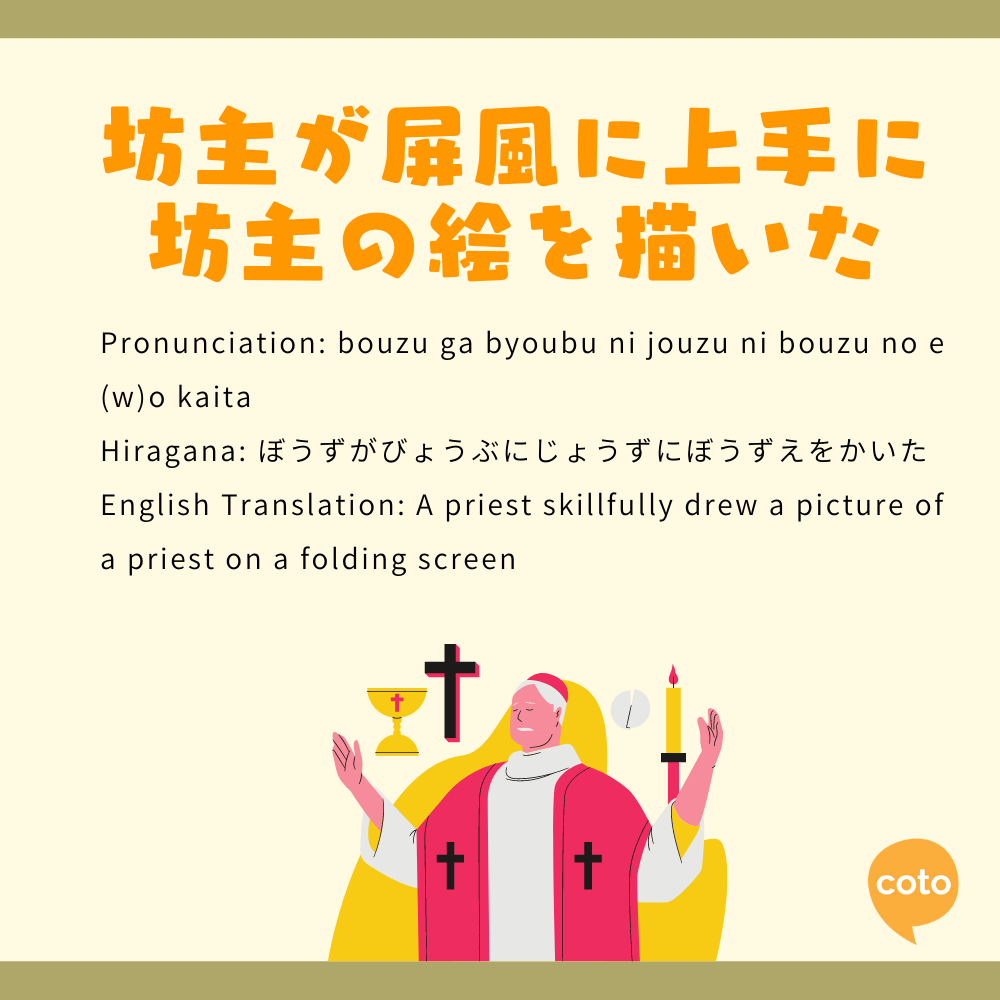
2. 坊主が屏風に上手に坊主の絵を書いた
Pronunciation: bouzu ga byoubu ni jouzu ni bouzu no e o kaita
Hiragana: ぼうずがびょうぶにじょうずにぼうずのえをかいた
English Translation: The monk skillfully drew a picture of a monk on a screen

3. 赤巻紙, 黄巻紙, 青巻紙
Pronunciation: akamakigami, kimakigami, aomakigami
Hiragana: あかまきがみきまきがみあおまきがみ
English Translation: Red scroll, yellow scroll, blue scroll

4. バスガス爆発
Pronunciation: Basu gasu bakuhatsu
Hiragana: バスガスばくはつ
English translation: Bus gas explosion

5. ブタがブタをぶったのでぶたれたブタがぶったブタをぶった。
Pronunciation: buta ga buta o butta node butareta buta ga butta buta o butta.
English Translation: The pig beat the pig. Therefore, the beaten pig beat the beater pig.
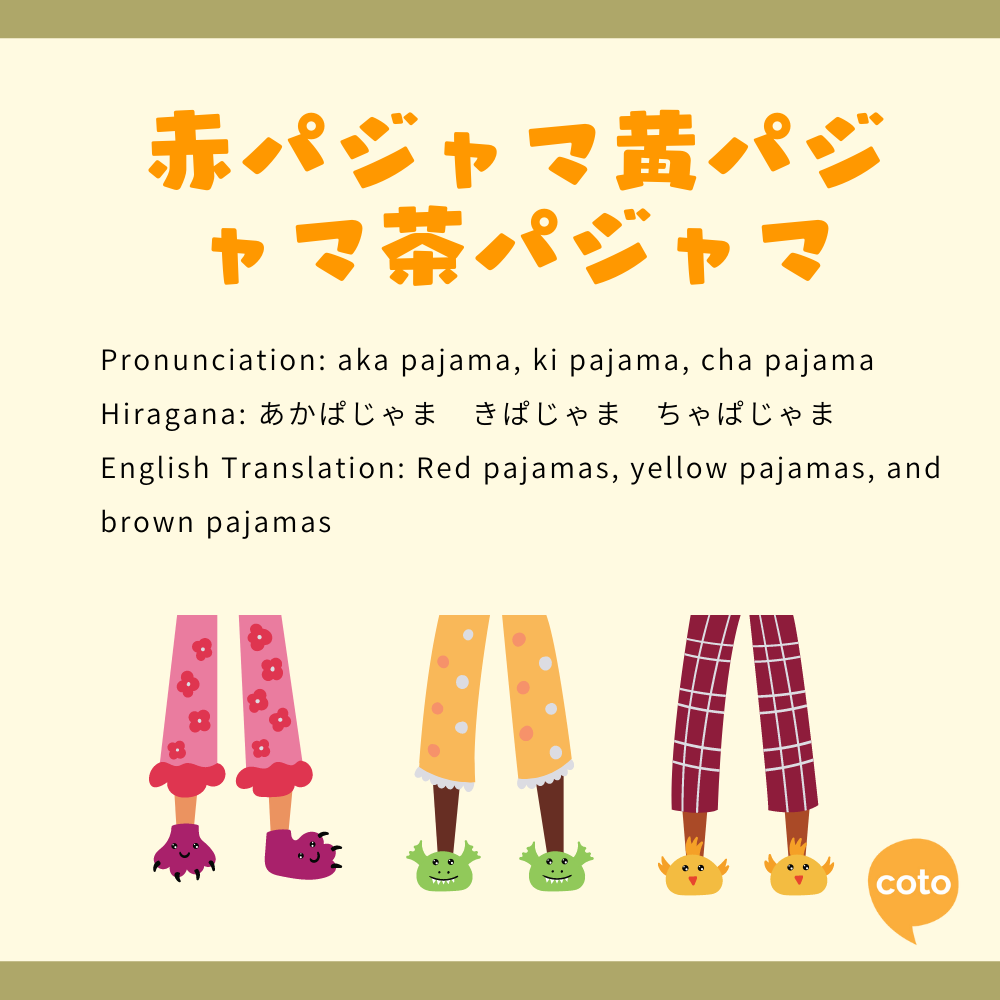
6. 赤パジャマ黄パジャマ茶パジャマ
Pronunciation: aka pajama, ki pajama, cha pajama
Hiragana: あかぱじゃま きぱじゃま ちゃぱじゃま
English Translation: Red pajamas, yellow pajamas, and brown pajamas
Intermediate Japanese Tongue Twisters
Is rolling your tongue for the above phrases too much of a breeze? We’ll bump up the difficulty a notch. These tongue twisters are only getting longer, with more repetitive and similar consonants.

7. この釘は引き抜くい釘だ
Pronunciation: kono kugi wa hikinukui kugi da
Hiragana: このくぎはひきぬきにくいくぎだ
English Translation: This nail is difficult to pull out.
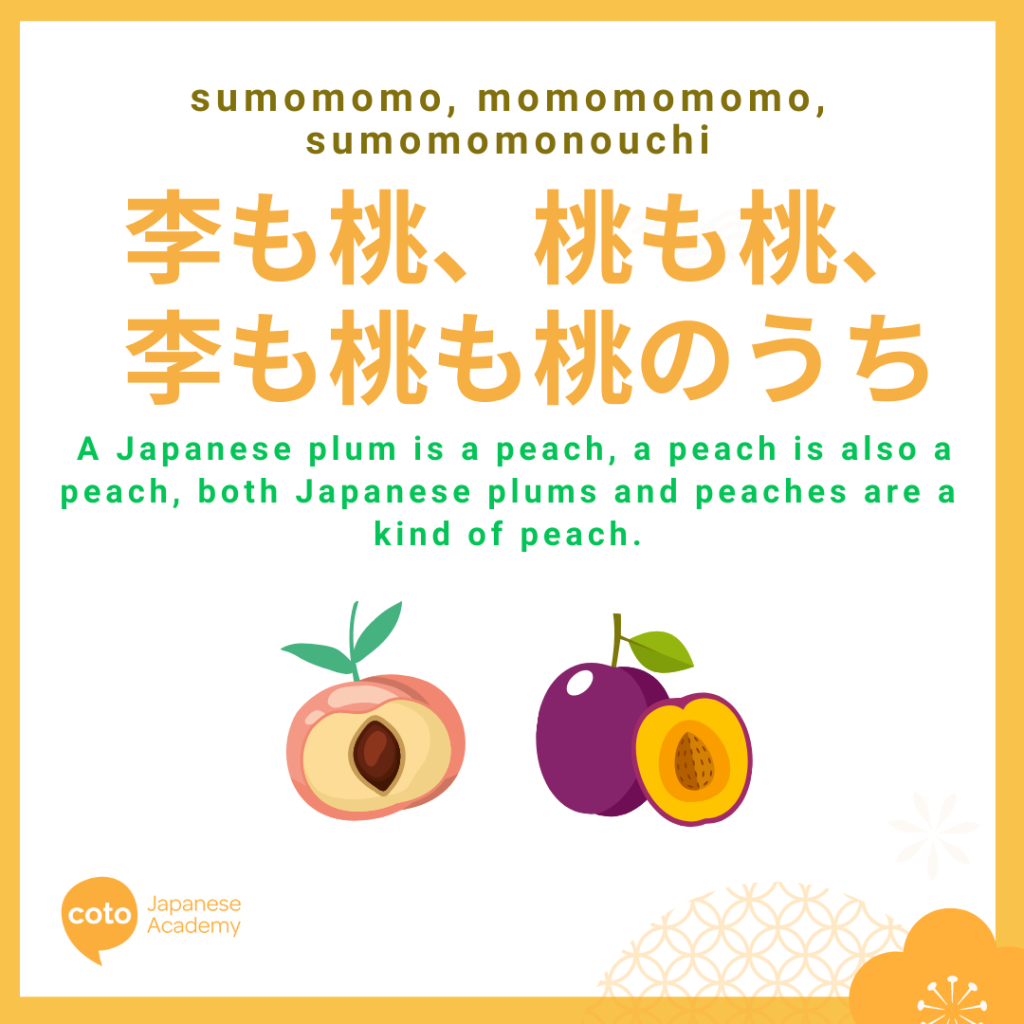
8. 李も桃、桃も桃、李も桃も桃のうち。
Pronunciation: sumomo mo momo, momo mo momo, sumomo mo momo mo momo no uchi.
Hiragana: すもももももももももも、すもももももももものうち。
English translation: A Japanese plum is a peach, a peach is also a peach, and both Japanese plums and peaches are a kind of peach.

9. 蛙ぴょこぴょこ三ぴょこぴょこ合わせてぴょこぴょこ六ぴょこぴょこ
Pronunciation: Kaeru pyokopyoko mipyokopyoko awasete pyokopyoko mupyokopyoko
Hiragana: かえるぴょこぴょこみぴょこぴょこあわせてぴょこぴょこむぴょこぴょこ
English translation: The frogs jump, three (times) jump, together jump, six (times) jump.

10. バナナの謎はまだ謎なのだぞ
Pronunciation: banana no nazo wa mada nazo na no da zo
Hiragana: ばななのなぞは、まだなぞなのだぞ
English Translation: The mystery of the banana is still a mystery
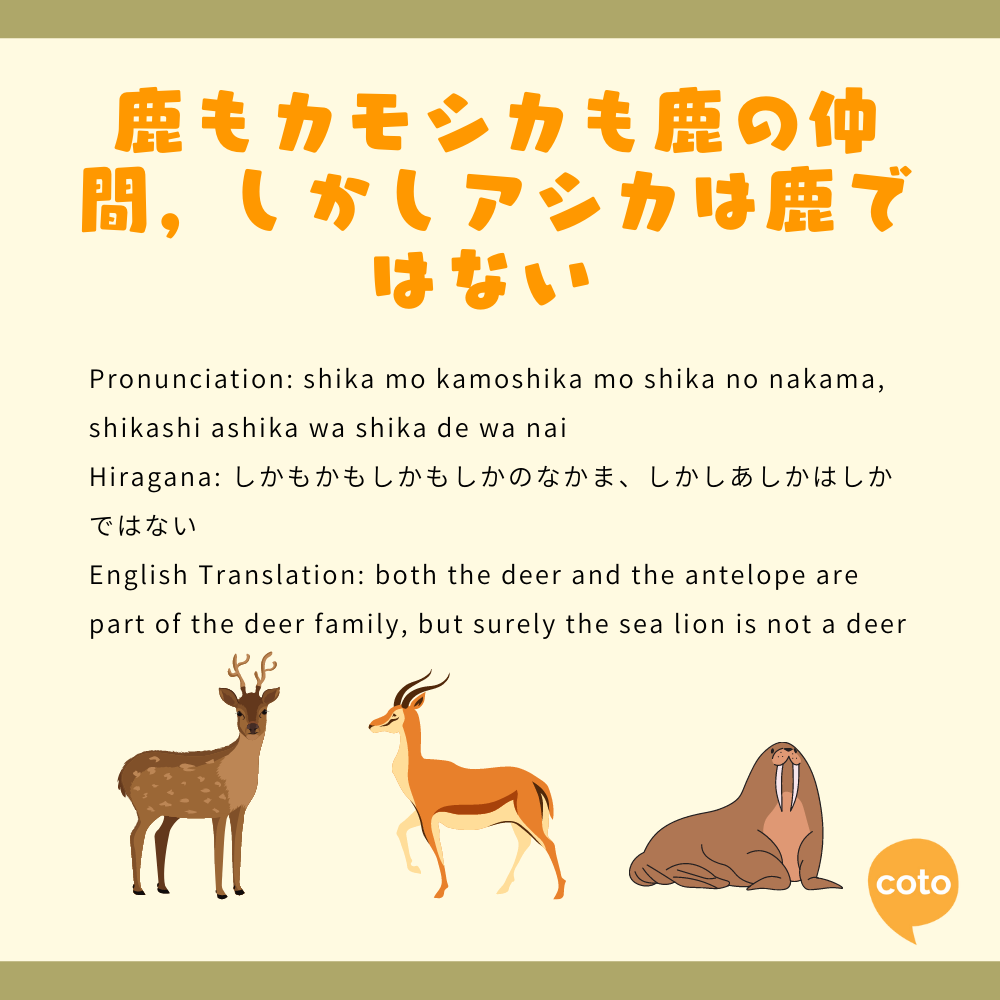
11. 鹿もカモシカも鹿の仲間, しかしアシカは鹿ではない
Pronunciation: shika mo kamoshika mo shika no nakama, shikashi ashika wa shika de wa nai
Hiragana: しかもかもしかもしかのなかま、しかしあしかはしかではない
English Translation: both the deer and the antelope are part of the deer family, but surely the sea lion is not a deer

12. 飲むなら乗るな、乗るなら飲むな。
Pronunciation: Nomu nara noru na, noru nara nomu na.
Hiragana: のおむならのるな、のるならのむな
English Transaction: If you drink don’t drive, if you drive don’t drink.
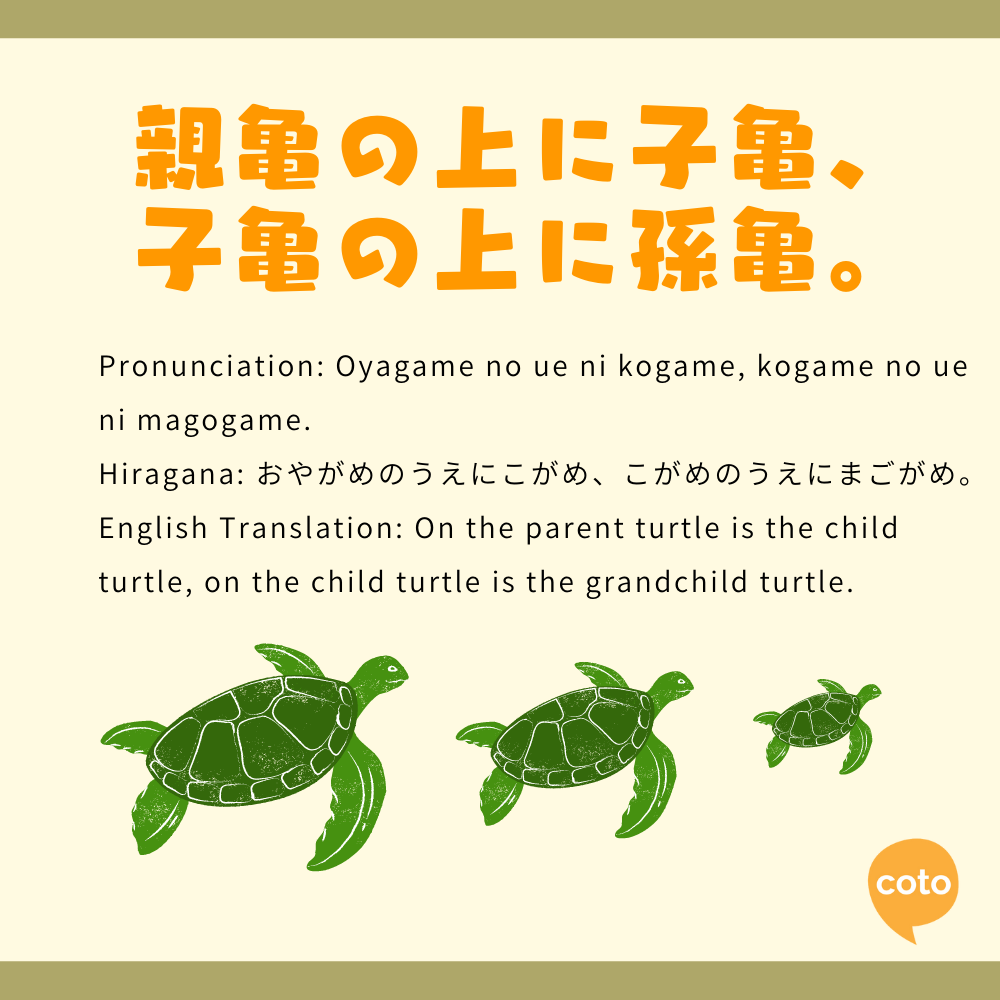
13. 親亀の上に子亀、子亀の上に孫亀。
Pronunciation: Oyagame no ue ni kogame, kogame no ue ni magogame.
Hiragana: おやがめのうえにこがめ、こがめのうえにまごがめ。
English Translation: The parent turtle is the child turtle, and the child turtle is the grandchild turtle.
Hardest Japanese Tongue Twisters
These tongue twisters require more focus and practice. Still, even if you don’t speak any Japanese, that doesn’t mean you can’t try out some of these!
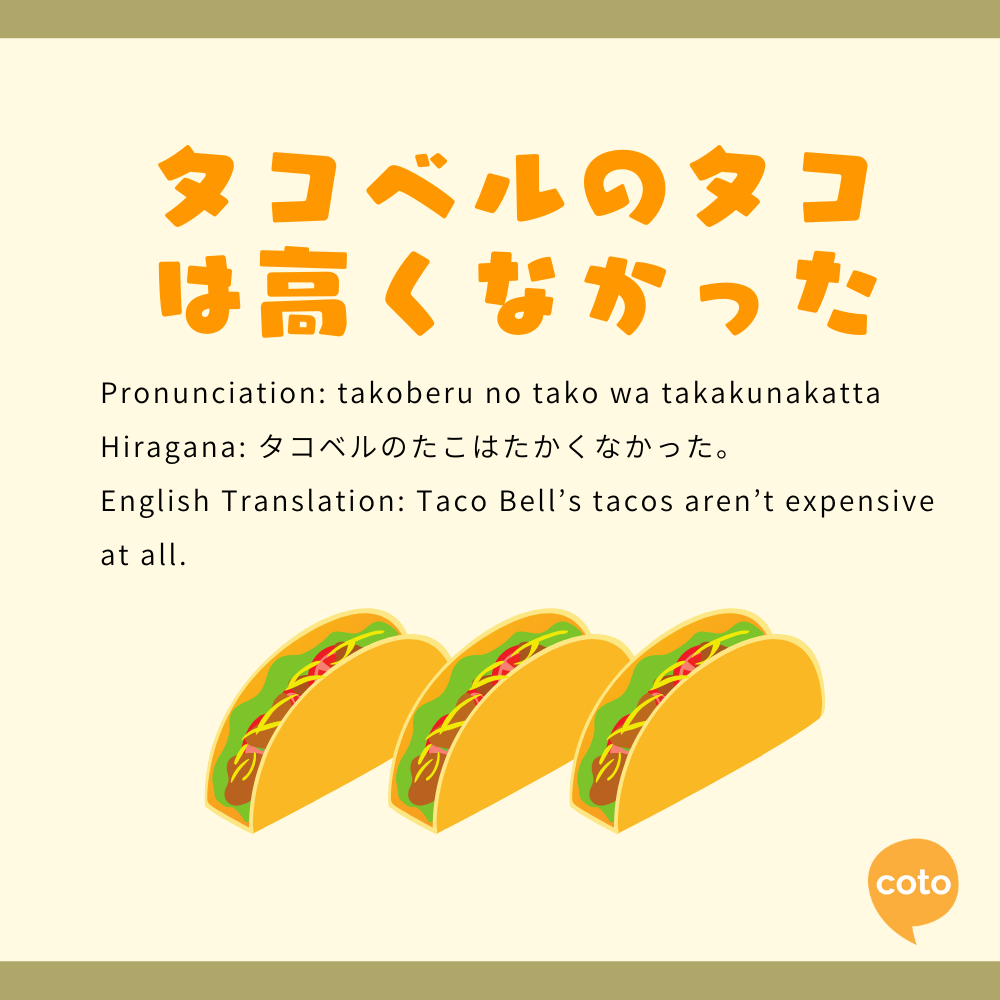
14. タコベルのタコは高くなかった
Pronunciation: takoberu no tako wa takakunakatta
Hiragana: タコベルのたこはたかくなかった。
English Translation: Taco Bell’s tacos aren’t expensive at all.
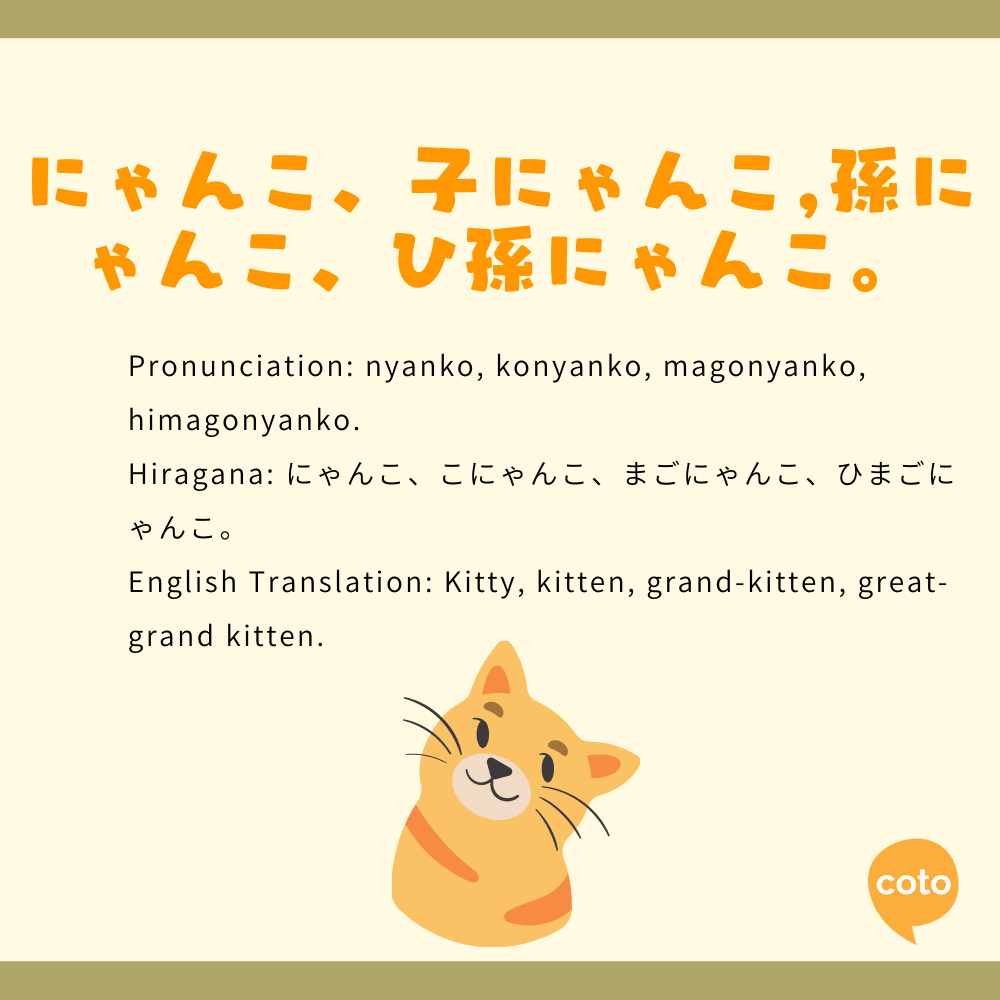
15. にゃんこ、子にゃんこ、孫にゃんこ、ひ孫にゃんこ。
Pronunciation: nyanko, konyanko, magonyanko, himagonyanko.
Hiragana: にゃんこ、こにゃんこ、まごにゃんこ、ひまごにゃんこ。
English translation: Kitty, kitten, grand-kitten, great-grand kitten.
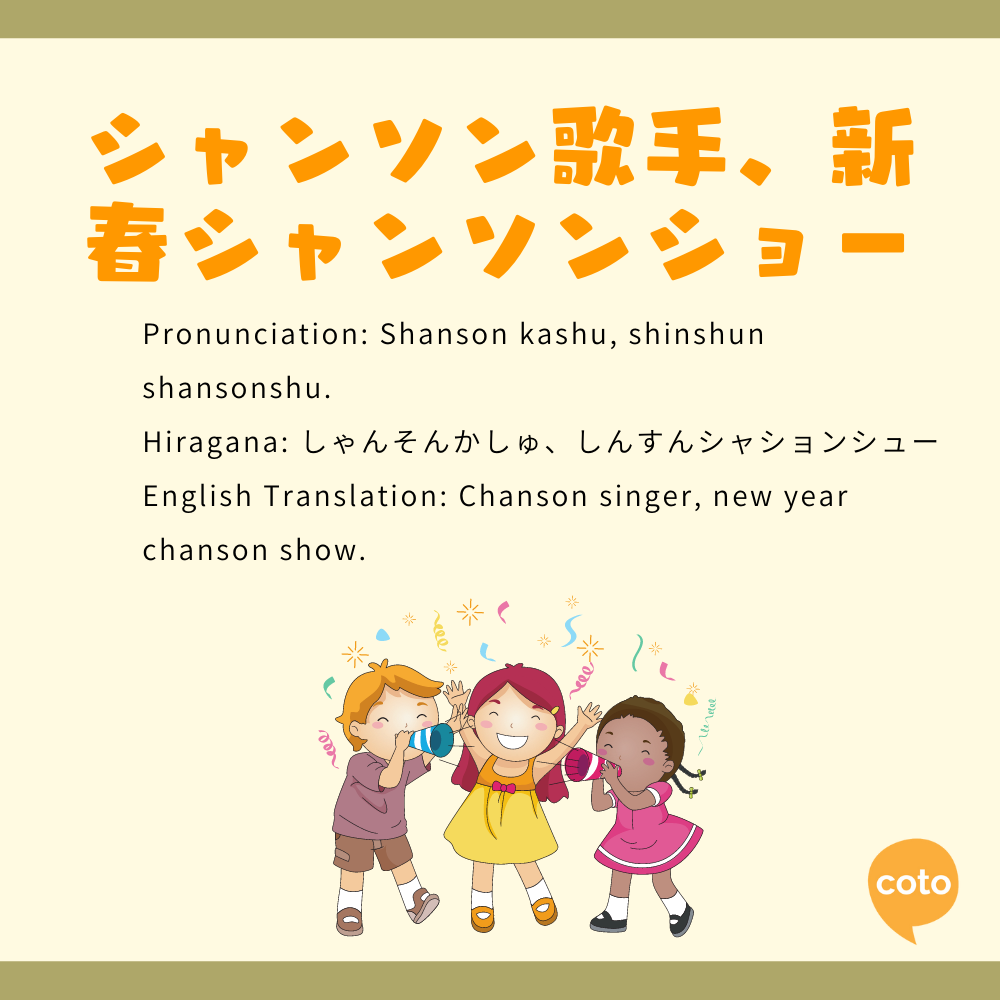
16. シャンソン歌手、新春シャンソンショー
Pronunciation: Shanson kashu, shinshun shansonshu.
Hiragana: しゃんそんかしゅ、しんすんシャションシュー
English Translation: Chanson singer, New Year chanson show.
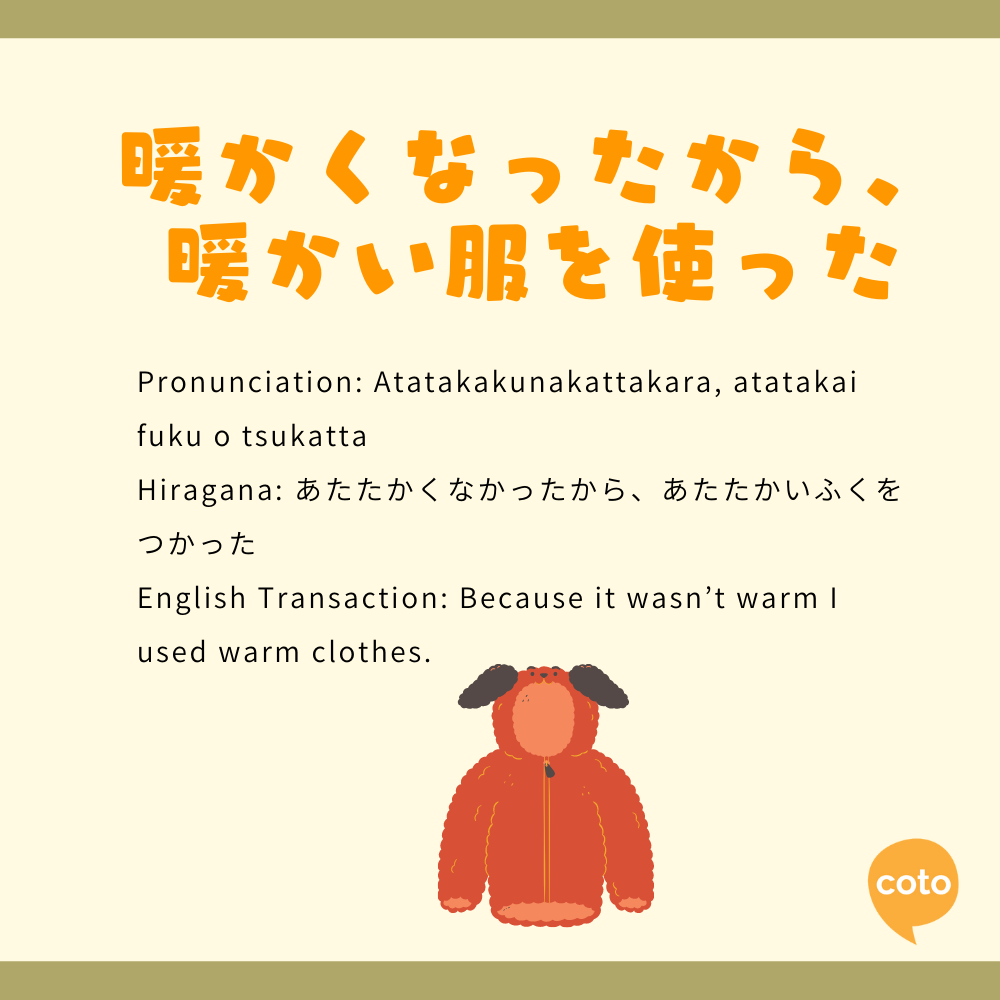
17. 暖かくなったから、暖かい服を使った
Pronunciation: Atatakakunakattakara, atatakai fuku o tsukatta
Hiragana: あたたかくなかったから、あたたかいふくをつかった。
English transaction: Because it wasn’t warm, I used warm clothes.
Notice that the word atatakai (warm) is heavily modified? This is because Japanese i-adjectives conjugate themselves. To learn more about this, visit our guide to Japanese adjectives.

18. 右目右耳 右耳右目
Pronunciation: Migime migi mimi migi mimi migi me
Hiragana: みぎめみぎみみみぎみみみぎめ
English translation: Right eye, right ear, right ear, right eye

19. 隣りの客はよく柿食う客だ
Pronunciation: tonari no kyaku wa yoku kaki kuu kyaku da
Hiragana: となりのきゃくはよくかきくうきゃくだ
English translation: The guest next door eats a lot of persimmons

20. この竹垣に竹立て掛けたのは竹立て掛けたかったから、竹立て掛けた
Pronunciation: kono takegaki ni take tatekaketa no wa take tatekaketakattakara , take tatekaketa
Hiragana: このたけがきにたけたてかけたのはたけたてかけたかったから、たけたてかけた
English Translation: I laid this bamboo against the bamboo fence because I wanted to lay bamboo against it

21. 裏庭には二羽, 庭には二羽鶏がいる
Pronunciation: ura niwa ni wa niwa, niwa ni wa niwa niwatori ga iru
Hiragana: うらにわにわにわにわにわにわにわとりがいる
English Translation: There are two chickens in the backyard and two chickens in the front yard

22. 東京特許許可局長
Pronunciation: toukyou tokkyo kyokakyokuchou
Hiragana: とうきょうとっきょきょかきょくちょう
English translation: Director of Tokyo Patent Licensing Bureau
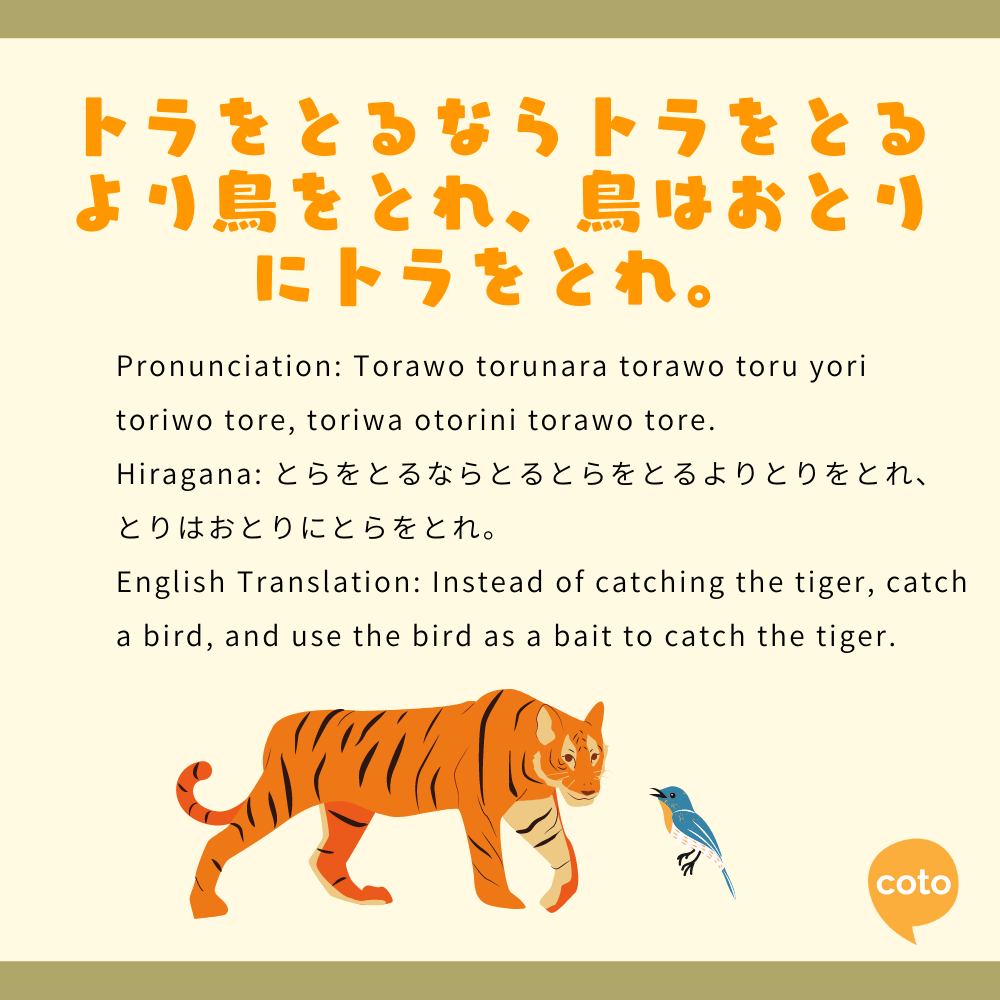
23. トラをとるならトラをとるより鳥をとれ、鳥はおとりにトラをとれ。
Pronunciation: Torawo torunara torawo toru yori toriwo tore, toriwa otorini torawo tore.
Hiragana: とらをとるならとるとらをとるよりとりをとれ、とりはおとりにとらをとれ。
English Translation: Instead of catching the tiger, catch a bird and use the bird as bait to catch the tiger.
If you want to practice some more tongue twisters here you have some with audio!
Learn “Real” Conversational Japanese at Coto Japanese Academy
Ready to learn Japanese? Join Coto Academy’s in-person or online Japanese courses. We want to hear more from you. Sign up to get a free level assessment and lesson consultation.
Want to study Japanese with us?
FAQ
What are Japanese tongue twisters?
Japanese tongue twisters, or 早口言葉 (hayakuchi kotoba), are phrases that are challenging to pronounce quickly due to similar or repetitive sounds. They are used to practice and enhance pronunciation skills in Japanese.
How can practicing tongue twisters benefit Japanese language learners?
Practicing tongue twisters helps learners improve their pronunciation, enunciation, and fluency. It trains the mouth and tongue muscles to produce Japanese sounds more accurately and quickly, leading to clearer speech.
Can you provide examples of common Japanese tongue twisters?
Certainly! Here are a few examples:
- 隣の客はよく柿食う客だ (となりのきゃくは よく かきくう きゃくだ)
Tonari no kyaku wa yoku kaki kū kyaku da
Translation: “The customer next to me often eats persimmons.” - 生麦生米生卵 (なまむぎ なまごめ なまたまご)
Namamugi namagome namatamago
Translation: “Raw wheat, raw rice, raw egg.” - 赤巻紙青巻紙黄巻紙 (あかまきがみ あおまきがみ きまきがみ)
Akamakigami aomakigami kimakigami
Translation: “Red scroll, blue scroll, yellow scroll.”
How often should I practice Japanese tongue twisters?
Practicing for just 5-10 minutes daily can lead to significant improvements in pronunciation and fluency.
Are Japanese tongue twisters used in educational settings?
Yes, Japanese children often learn tongue twisters as both educational tools and games to enhance their language skills.
Can tongue twisters help with accent reduction in Japanese?
Yes, regular practice of tongue twisters can help train your mouth muscles to produce authentic Japanese sounds, aiding in accent reduction.
Are there different difficulty levels in Japanese tongue twisters?
Yes, Japanese tongue twisters range from simple phrases to complex sentences, allowing learners to progress from easy to more challenging expressions as their skills improve.
How can I effectively practice Japanese tongue twisters?
To practice effectively:
- Seek Feedback: Practicing with native speakers or language partners can provide valuable corrections and tips.
- Start Slowly: Begin by pronouncing the tongue twister slowly to ensure correct pronunciation.
- Gradually Increase Speed: As you become more comfortable, try to say it faster while maintaining accuracy.
- Repeat Regularly: Consistent practice helps in mastering the sounds and improving fluency.
- Record Yourself: Listening to your pronunciation can help identify areas that need improvement.
